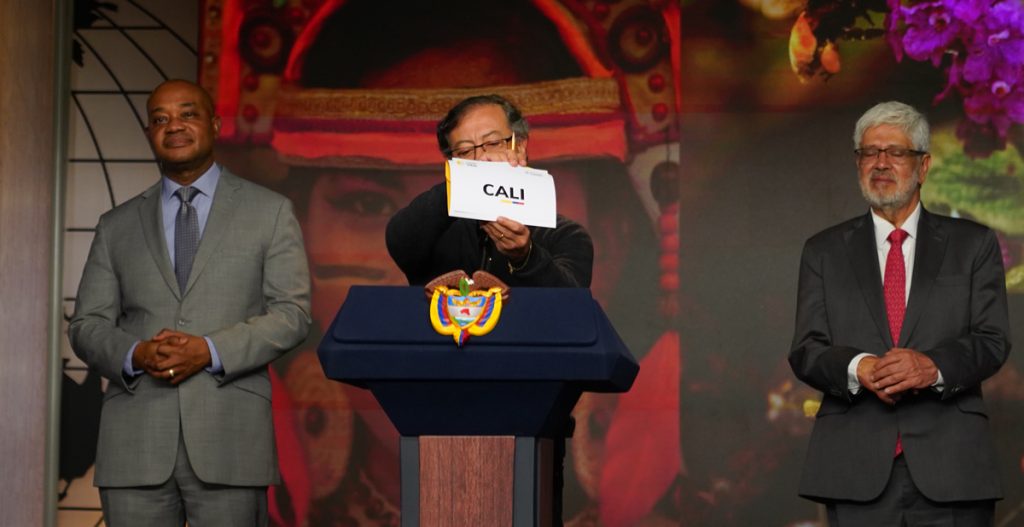Bogota, February 20, 2024. Santiago de Cali, capital of the Colombian Pacific, has been selected by President Gustavo Petro as the host city for the COP16 on Biodiversity, the most important international event ever held in the country.
“As a powerhouse of natural biodiversity and human diversity, with a rich history, the Pacific region gives us the opportunity for Colombia to show why it is the country of beauty. This is also an opportunity to heal wounds, to seal a social pact, to put the eyes of the world on the Pacific, on its regions and conflicts. This is the time for the protection of life, of Peace with Nature”, said Gustavo Petro, President of the Republic.
Bogota and Cali were the pre-selected cities to host this event, which is expected to attract at least 12,000 people and where progress towards the fulfillment of 23 biodiversity protection goals will be discussed. According to the UN, the two cities met the requirements to host the event.
The richness of culture and biodiversity, gave the city of Cali, extra values when making the decision. This, commonly known as the 'Sucursal del Cielo', represents the diversity of the Pacific, where 30% of its inhabitants are recognized as Afro or indigenous. In addition, 40% of the region is made up of autonomous territories of ethnic communities.
“We want this to be the COP of the people, of those who live and prosper in biodiversity, where Peace with Nature, is enacted, and to be one of the pillars of the climate crisis. The UN visited the country, was in the two cities and issued a statement recognizing that both cities complied with the requirements. Bringing this event to Cali will have the greatest transforming effect, to show the world the biodiversity and bring an event to the four departments of the Pacific,” said Susana Muhamad, Minister of Environment and Sustainable Development.
The Pacific region has more than 200 protected areas, 11 National Natural Parks that make up 51,388 square kilometers of biodiversity, and habitat for 1297 species of fauna, as well as 14,000 species of plants.

“This is a country event, which unites us as a nation and shows the world the biodiversity and cultural power of Colombia”: said President Gustavo Petro.
“Never before have we had so many heads of state, foreign ministers, environment ministers, but also communities, because this will be the COP of the people, of the grassroots, but it will also be the COP that unites the country. This is a national event. We are not only sending a message to the world about what Colombia is proposing to the world, but also that the world is going to come here to make decisions. 200 delegations: it is historic” assured Luis Gilberto Murillo, Minister (e) of Foreign Affairs.
About COP16 on Biodiversity
The Conference of the Parties (COP) to the Convention on Biological Diversity (CBD) is an international treaty adopted at the Earth Summit in Rio de Janeiro in 1992 and entered into force in 1993, with the aim of conserving biological diversity, ensuring its sustainable use, and guaranteeing the fair and equitable sharing of the benefits arising from the utilization of the genetic resources of species.
Cali, as the capital of the Pacific, has the opportunity to elevate a multiethnic and multicultural region, with protected areas, National Natural Parks and rich biodiversity. COP16 will be held at the Valle del Pacífico Events Center.
The COP on biodiversity is an international forum to establish agendas, commitments and frameworks for action in relation to the conservation of biodiversity and ecosystem services, and to address challenges such as the climate crisis, loss of natural habitats, overexploitation of natural resources, among others.
It is held every two years and brings together representatives from more than 190 member countries of the convention, as well as intergovernmental and non-governmental organizations, civil society and other relevant actors.
Kunming-Montreal Global Biodiversity Framework
On December 19, 2022, during the COP 15, held in Montreal, Canada, the Kunming-Montreal Global Biodiversity Framework was unanimously adopted. This Framework seeks to halt and reverse the loss of nature, in a context where scenarios that threaten the survival of millions of species and people are becoming increasingly common. The objective of this framework is to protect and use the services provided by biodiversity in a sustainable manner.
The Kunming-Montreal Global Biodiversity Framework sets out a transformative vision to guide and support countries on biodiversity through 4 goals and 23 targets.


